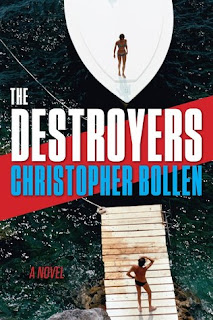The Destroyers
Summary (from the publisher): Arriving on the Greek island of Patmos broke and humiliated, Ian Bledsoe is fleeing the emotional and financial fallout from his father’s death. His childhood friend Charlie—rich, exuberant, and basking in the success of his new venture on the island—could be his last hope.
At first Patmos appears to be a dream—long sun-soaked days on Charlie’s yacht and the reappearance of a girlfriend from Ian’s past—and Charlie readily offers Ian the lifeline he so desperately needs. But, like Charlie himself, this beautiful island conceals a darkness beneath, and it isn’t long before the dream begins to fragment. When Charlie suddenly vanishes, Ian finds himself caught up in deception after deception. As he grapples with the turmoil left in his friend’s wake, he is reminded of an imaginary game called Destroyers they played as children—a game, he now realizes, they may have never stopped playing.
An enthralling odyssey and a gripping, expansive drama, The Destroyers is a vivid and suspenseful story of identity, power and fate, fathers and sons, and self-invention and self-deception, from a writer at the very height of his powers.
Review: I received an uncorrected proof copy of this novel from HarperCollins.
After his father's death leaves him destitute, Ian Bledsoe calls upon his wealthy childhood friend Charlie to bail him out of his financial straits. Charlie invites Ian to the Greek island of Patmos to assist him with his business. At first, the island escape seems like the perfect solution to his problems: a beautiful setting, the unexpected appearance of a girlfriend from his past, and the offer of a job from Charlie to help him regain financial security. When Charlie asks Ian to cover for his absence for a few days but then ends up disappearing, Ian finds himself caught up in a deception that continues to grow larger and darker.
Disappointingly, most of the characters lacked any depth to speak of, which left the book feeling flat. The much referenced bad blood between Ian and his family is never truly fleshed out and the tension between Ian and Charlie's girlfriend Sonny is left unresolved. Despite Ian's supposed increasing affection for his former girlfriend Louise, there's little evidence of this in his actions, which are instead characterized by repeated homoerotic elements. Ian and Charlie seem almost more than friends; Ian refers to a adolescent game they played where they pretended to be "prepubescent lovers" (46), Ian catches a glimpse of Charlie's testicle, a "single oblong ball peeking from yellow fabric" (150), and even other friends question the true nature of their relationship. Despite the text being littered with references to Charlie's physical presence, little true attraction or notice is made of Louise, Ian's supposed love interest. This sexual tension was really the only interesting character trait included in the novel.
This novel did an excellent job of reeling me in and building suspense from early on; the opening chapter was excellent and compelling. Yet it dragged interminably in the middle, as Ian as narrator kept up an endless patter about his suspicions and concerns, while relatively little happened. The narrative is littered with ominous turns of phrase; a character "stabbed her key into the neck of the motorbike" (1) and the "the patio door is scythe-blade-streaked with glass cleaner" (131), yet the grand finale was a disappointment and difficult to believe. The early promise of this novel failed to sustain through its conclusion.
Stars: 3
Related Title: Orient by Christopher Bollen



Comments
Post a Comment